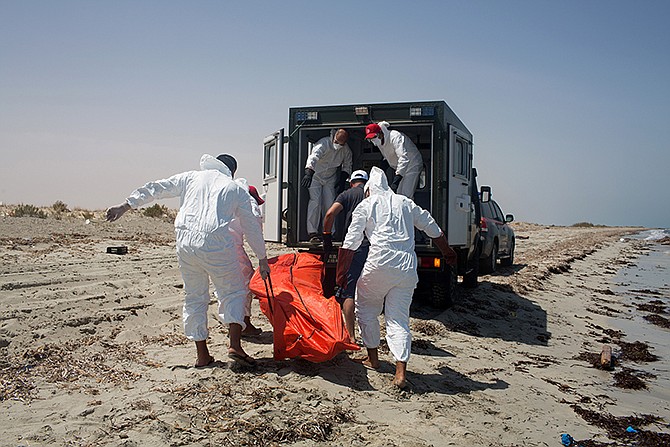VIENNA (AP) - Death and desperation mounted in Europe's migrant crisis Friday as Austrian police said 71 people appeared to have suffocated in the back of an abandoned truck, while an estimated 200 people were feared drowned off Libya when two overloaded boats capsized.
More than 300,000 people have sought to cross the Mediterranean Sea so far in 2015, up from 219,000 in all of last year, as European authorities grapple with the largest influx since World War II.
The death of 71 people locked in the truck on a highway south of Vienna shows "the desperation of people seeking protection or a new life in Europe," said Melissa Fleming, spokeswoman for the U.N. refugee agency in Geneva.
The International Office of Migration has recorded 2,636 deaths linked to Mediterranean crossings this year, and more may have vanished beneath the waves out of sight of rescuers.
Each day, thousands are boarding flimsy boats for Italy or Greece, and many more are placing themselves and their families at the mercy of human traffickers by slogging for days or weeks through the western Balkans toward what they hope will be a brighter future. Most are fleeing war, conflict or persecution in countries including Syria, Afghanistan and Eritrea.
Several factors are driving the surge of Syrian refugees, including worsening conditions in that country's refugee centers partly due to budget cuts and the reluctance of neighboring countries to take in more people, the U.N. said.
Two ships went down Thursday off the western Libyan city of Zuwara, where Hussein Asheini of the Red Crescent said at least 105 bodies had been recovered. About 100 people were rescued, according to the Office of the U.N. High Commissioner for Refugees, with at least 100 more believed to be missing.
"A coast guard team is still diving in and checking inside to see if there's anyone else," Asheini added.
Workers pulled the dead from the water and placed them in orange-and-black body bags that were laid out on the waterfront in Zuwara, about 65 miles west of Tripoli. Several victims floated face-down in a flooded boat towed into the harbor. At least one of the dead wore a life vest.
Most of the people rescued came from Syria and sub-Saharan African countries, said Mohamed al-Misrati, the spokesman for the Red Crescent in Libya.
"You can imagine what they are going through. Some of them are still looking for their friends. We're trying to speak to them but many of them are too traumatized to even talk about the incident," he said.
Lawless Libya, which doesn't have the resources to deal with the flow of migrants, is a prime starting point for many, with human traffickers filling boats they know cannot reach European shores but figuring that rescuers will pick up the passengers and take them to Italy.
Often, the smugglers force migrants below deck where their chances of survival are even dimmer. Rescuers who boarded one boat Wednesday counted 52 people who suffocated in the hold, according to the U.N. refugee agency. Survivors said the smugglers beat them with sticks to keep them below deck, and one said they demanded money to let the migrants come up for fresh air.
While the U.N. agency said more than 300,000 refugees crossed the Mediterranean so far this year, the International Office of Migration, an intergovernmental agency, put the number at 332,000 on Friday.
Hungarian police arrested four people overnight after the decomposing bodies of 71 migrants, including included eight women and four children, were found in the truck on Austria's main highway.
The suspects, allegedly part of a larger Bulgarian-Hungarian smuggling ring, include an Afghan and three Bulgarians, one of whom owns the truck, Hungarian national police spokeswoman Viktoria Csiszer-Kovacs said. Police raided houses and questioned almost 20 others in the case.
Hans Peter Doskozil, chief of police in eastern Burgenland province, said the migrants probably suffocated. At least some of the dead were Syrian, travel documents indicated, though most of the partially decomposed bodies remained unidentified.
The 71 bodies were moved from a warehouse, where the abandoned truck was towed Thursday, to a Vienna morgue for autopsies. Workers in gloves and masks lifted body bags into coffins neatly lined up on the warehouse ramp.
The tragedy "should serve as a wake-up call ... for joint European action" in dealing with the migrants flocking to Europe, said Austrian Interior Minister Johanna Mikl-Leitner.
Added Fleming: "We believe this underscores the ruthlessness of people smugglers who have expanded their business from the Mediterranean Sea to the highways of Europe. It shows they have absolutely no regard for human life, and that they are only after profit."

